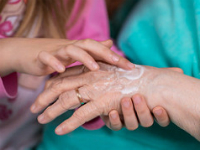 The blistering winds and bitter cold of winter can have a huge impact on your senior patient’s skin, stripping it of moisture and resulting in bleeding, itching, and/or cracking. Seniors are especially vulnerable to skin problems. Their skin becomes drier, thinner, loses fat, and is more fragile as they begin to age. Many elderly individuals have dry spots that invade their skin, mostly on their lower arms, elbows and lower legs. The winter season can bring about scaly, rough dry skin patches as well.
The blistering winds and bitter cold of winter can have a huge impact on your senior patient’s skin, stripping it of moisture and resulting in bleeding, itching, and/or cracking. Seniors are especially vulnerable to skin problems. Their skin becomes drier, thinner, loses fat, and is more fragile as they begin to age. Many elderly individuals have dry spots that invade their skin, mostly on their lower arms, elbows and lower legs. The winter season can bring about scaly, rough dry skin patches as well.
According to a board certified dermatologist, Rebecca Baxt, M.D., who is a fellow at the American Academy of Dermatology and is a board-certified dermatologist, these skin issues can get compounded when the winter weather hits and can make a senior more susceptible to itchy skin and different types of rashes including Seborrheic dermatitis and Eczema craquele (xerosis).
Some practical tips to keep your senior patient’s skin healthy in the winter are as follows.
Begin a Regular Moisturizing Regimen
Whether your senior client has eczema, psoriasis or xerosis (severely dry skin), it’s essential you start a moisturizing regimen right away to retain moisture and prevent its loss due to dry air. This is particularly true when the weather begins to get cold. After your elderly client has had her bath, she should apply a lotion to her skin. You can also have her wrap her problematic areas with plastic wrap and leave on for around 30 minutes after moisturizing, which will promote softness to her skin.
Have Her Bundle up
Make sure she bundles up before she steps out into the frigid air outside. All exposed skin should be covered up if possible to avoid wind burn or frostbite.
Turn the Humidity Up
Artificially-heated, dry air can be infused with much-needed moisture by using full room humidifiers. A humidifier can be added as an accessory to a home’s main furnace, or a portable humidifier can also work well.
Have Her Eat Healthy
Make sure your senior clients are eating foods that are healthy for them. Foods that are rich with omega-3 fatty acids are good since they can improve the skin’s appearance and condition. These improvements can often be noticed in just a couple weeks. The omega-3′s help keep skin cells lubricated which contributes to a rejuvenated appearance. Have them include foods like walnuts, navy beans, salmon, winter squash and olive oil to their diet; these foods are great for the skin as well as being good for your client’s overall well-being. Also, reiterate the importance of drinking lots of water and other fluids to help keep the skin moist.
Although you might think that applying lotion to your senior client’s skin every day is all you need to do, this isn’t the case. Lotions do work at keeping the skin moisturized, but not all lotions work the same during the winter season, so be sure to promote the above winter skincare tips to seniors.
This entry was posted in Assisted Living and tagged healthy aging, healthy skin, healthy skin during the winter. Bookmark the permalink.
Author: Ann Jamison
Ann Jamison is an experienced senior advisor who has successfully worked with hundreds of families to help them find the best care and home-like environment for themselves or their loved ones. Prior to launching Senior Living Options, Ann was an eldercare advisor for a national placement agency and served as sales director at a senior living community. Thanks to her 25-year career in advertising sales and marketing, Ann is able to discern between hype and reality for her clients. Ann recognizes that there are objective factors that need to be weighed when making a life-changing decision, but she can also assess the important softer attributes by getting to know her clients and by using the gut instincts that can only come through extended experience.



Leave a Reply
Your email is safe with us.
You must be logged in to post a comment.